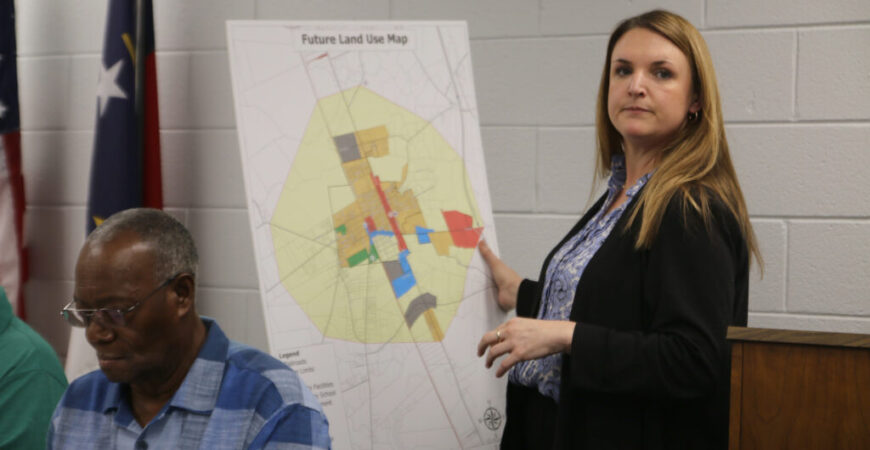ROSE HILL — The Rose Hill Board of Commissioners and the town’s planning board held a joint meeting Tuesday, Aug. 12, to hear a presentation on a proposed Comprehensive Land Use Plan for the town.
North Carolina statutes require municipalities to adopt a land use plan to enforce zoning regulations and guide future growth. Currently, Rose Hill does not have this required plan in place, so it has engaged Insight Consulting Group to assist in creating one. During the meeting, the board listened to an almost hour-long presentation by Ashli Barefoot.
According to Barefoot, several factors went into creating the proposed plan, including the town’s demographics, its housing situation, the local economy, and feedback collected from an online survey, as well as in-person surveys conducted during the 2024 North Carolina Poultry Jubilee.
In the proposed future land use plan, areas are targeted as either commercial, industrial, office institutional, low-density agriculture, medium high density (primarily housing) and recreation.
During the presentation, a few members of the public attending the meeting questioned a small area of land that had been targeted for recreational use in the plan. Since the specific area that borders West Ridge Street for a few blocks is privately owned land, the concern is how that could affect the landowners should they wish to sell or develop the property in the future. Barefoot said the area had been mistakenly selected and the plan would be corrected.
Barefoot added the land use plan does not restrict any specific use for the land but is designed to be consulted in future growth and zoning plans.
Notable in Barefoot’s presentation were what the consultants considered Rose Hill’s strengths and weaknesses.
She said the strengths included the tourist opportunities thanks to Duplin Winery and the World’s Largest Frying Pan, efficient emergency services, the geographic advantage of being close to I-40 and US Hwy 117, diversity, nearby large employers, a friendly community and a relatively low crime rate.
Barefoot advised the town to stay informed on the North Carolina Department of Transportation’s rail feasibility study, which could reactivate passenger rail service between Raleigh and Wilmington. The right-of-way for that route would include the existing tracks that run through the Rose Hill downtown area. The report recommends that the town advocate for a train stop in Rose Hill, should the rail project proceed, due to the potential economic development benefits. While Rose Hill does not have a train depot, it could be an important investment for the town.
Listed as town weaknesses were limited businesses, a visual aesthetic that needs improving, a lack of affordable housing, limited entertainment, and challenges in disseminating information in the community.
In addition, the presentation targeted what were referred to as threats to the area, including air quality, environmental concerns, a lack of visible growth, substandard housing, and concerns with education.
Barefoot said the weaknesses and threats targeted should be considered as opportunities to improve the town by using the land use plan to find ways to attract businesses and offices to currently vacant buildings and marketing recreational opportunities and tourism.
In order to make corrections to the plan regarding areas targeted as recreational, plus provide additional time for additional public input, the planning board and board of commissioners both voted to table a final vote on the plan until the Oct. 14 board meeting.
In other business, the board of commissioners voted to increase water and sewer tap fees to be more in line with the actual cost of installing the taps after hearing the recommendation from Town Administrator Angela Smith.
Smith said current tap fees for the most common ¾-inch water tap and four-inch sewer tap are $700 for each.
“We did a cost estimate as to what it actually cost for a ¾ inch tap and it was over $1,100,” Smith said. “For a four-inch sewer tap, it was $860. That does not include any asphalt patch.”
The board voted to raise the current tap fees by $500 across the board.
Smith also recommended that the board begin charging a new fee for all zoning applications submitted for review.
“We contacted the other towns, and the minimum application fee is $50,” Smith told the board, recommending a $25 fee to cover administrative costs in processing the applications.
The board voted to approve the fee.
 Twitter
Twitter Facebook
Facebook Instagram
Instagram





